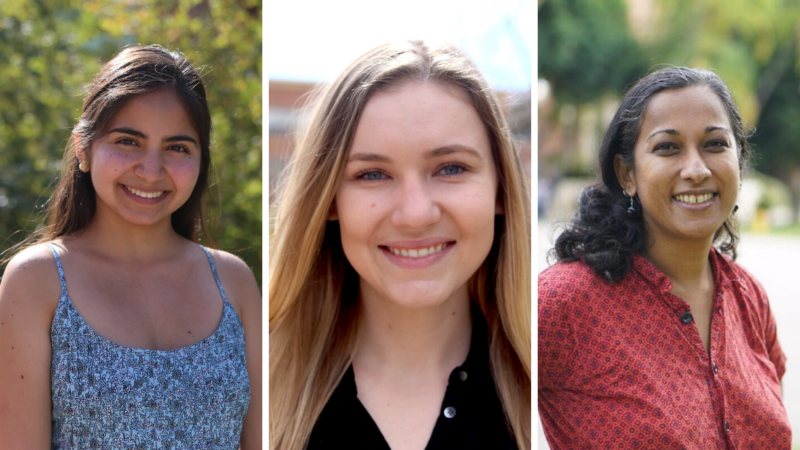
Three awarded by academic senate for diversity, equity and inclusion
Three individuals from the Center for Diverse Leadership in Science at UCLA have been honored with UCLA Academic Senate awards for diversity, equity and inclusion. One undergraduate, one graduate student and up to four faculty are awarded per academic year. Environmental science undergraduate student Venezia Ramirez, Atmospheric and Oceanic Science graduate student Alexandrea Arnold, and CDLS Founder and Faculty Director Aradhna Tripati were recognized for their leadership and dedication to inclusion for all people.
Ramirez is an early-career fellow who unequivocally contributes to the center’s K-12 outreach community engagement program and environmental justice working group. Her exemplary work reflects her values for ensuring underrepresented people have an equal opportunity to education and resources. In both UCLA and nearby communities, she vocalizes the racial, economic, and environmental injustices many face. Notably, Ramirez advocates for community well-being and has experience working with East Yard Communities of Environmental Justice, the 27th Annual RAZA Youth Conference hosted by the Movimiento Estudiantil Chicanx de Aztlan de UCLA, and the city of Maywood, California for whom she has provided research on the efficiency of using sunflowers to remediate their lead-contaminated soil. With the Institute of Environment and Sustainability’s high school film competition, GreenShorts, Ramirez mentored two high school students throughout their filmmaking process.
Arnold is a Chickasaw woman whose leadership skills have created scientific environments that emphasize mentorship for indigenous students in STEM. As a first-generation college student from a low-income background, she overcame numerous obstacles to study at UCLA. Her lived-experience helped create the student-led outreach program Environmental Justice and First Nations, and she helped develop programs including outreach to Navajo Technical University and Central High School run by United American Indian Involvement Inc. She has visited potential field sites on tribal lands to study the climate history of the region and integrates historical and archeological information in her research. As outreach chair of the graduate student group Chi Epsilon Pi in the Department of Atmospheric and Oceanic Sciences, Arnold created interactive mini-lectures featuring indigenous scientists who serve as role models. In the upcoming year, she plans to engage with and discuss climate change with Native American youth at schools on reservations near the areas she studies.
As a geoscientist and woman of color, Tripati intimately understands the various barriers that underrepresented students face while pursuing an education and career in green STEM fields. She has been recognized by the National Science Foundation, the Geological Society of America and the Center for Biological Diversity for scientific excellence and innovation, impact on minority career development and extensive values-driven community outreach. Inspired by her personal background and experience mentoring countless students, Tripati pioneered the creation of space for underrepresented students in STEM by establishing the first university-based center focused on inclusive diversity in environmental science, CDLS. In 2017, President Barack Obama presented Tripati with the Presidential Early Career Award for Scientists and Engineers, which recognized her efforts to engage members of underrepresented communities and promoting diversity in STEM among high school and college students.
The Center for Diverse Leadership in Science was developed by Tripati and a team of social scientists and inclusive education specialists to combat isolation and attrition in science. Its model was designed to increase the inclusion of underrepresented minorities, women, low-income students, LGBTQIA+, students with disabilities and single parents. The center has supported over 100 early career fellows from UCLA and local institutions in the past 2 years — from high school through postdoctoral levels — and 23 faculty fellows. Its early-career constituency is comprised of 55% women, 42% women of color, 69% people of color and 20% LGBTIA+. Collectively, this community has reached over 2,400 people through community outreach and more than 3000 people through teaching. The center provides a promising example for other academic entities that seek to holistically support a diverse student body and improve retention.
